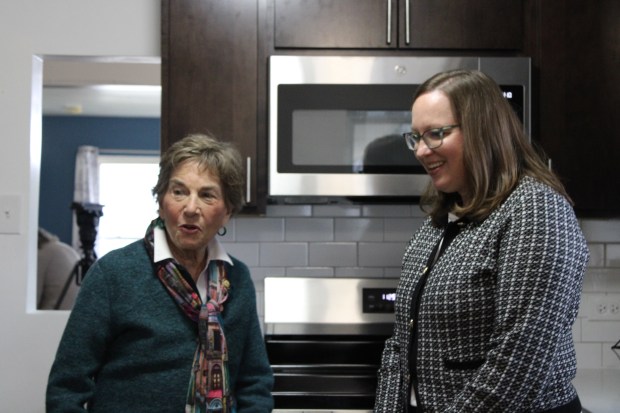U.S. Rep. Jan Schakowsky (D-Skokie) did not mince words about President Donald Trump’s plan to pause Medicaid payments when she spoke at a kitchen table conversation at a Skokie home for intellectually disabled adults on Feb. 3.
“I hate to say it, but right now, we’re in a very difficult moment where it seems to be very clear that the Trump administration wants to provide money for the wealthiest people and to undo money that is so precious and life-changing and positive for people with disabilities,” the Democratic Congresswoman said.
About two weeks ago, Trump’s Office of Management and Budget called for the temporary pause on funding, including for programs related to “foreign aid, nongovernmental organizations, DEI (diversity, equity and inclusion programs), woke gender ideology, and the green new deal.” Illinois state agencies reported then that state employees were unable to access Medicaid payment systems. A federal judge since then has blocked those efforts.
The kitchen table conversation was held at a home in the 4300 block of Church Street in Skokie, where five adult men with disabilities live in a program coordinated by Shore Community Services. Erin Ryan, Shore’s CEO, said that the residential program is mostly funded by Medicaid.
In addition to the residential program in Community Integrated Living Arrangements, also called CILA homes, Shore has a jobs training program. Nearly 400 individuals throughout the North Shore and Chicago area have received services through Shore, according to its annual report.
At the conversation, two mothers with sons in Shore CILA homes spoke about their experience with Shore.
Chicago mother Stephanie Joice said, “It’s been a life changer. It’s given him (her son) a life. It’s given my husband and me a life. We feel that he is well taken care of.”
Ryan said that the wait for help can be lengthy for families. “There are 14,000 people waiting for services like this on our waiting list,” she said. “Some states have been able to eliminate their waiting lists. Illinois has not yet, so we have a lot of people still waiting.”
Marylin Leipsiger’s son was one of such cases. The Skokie mother said that her son, Michael, was on a list for residential placement when he was 18 years old, and didn’t get to the top of the list until he was 36.
Along her son’s journey, Leipsiger said he faced difficulties and had grown violent at times. Ever since he found housing with Shore, she said that he is doing much better.
“He’s proud of himself, he’s independent, he’s happy,” she said.
Ryan said the services are billed to the state and parents do not pay for their children’s housing. The men’s income sources, including Social security and food stamps, are also pooled together, she said.
Schakowsky attempted to assuage parents’ fears about what would happen if the president were to attempt blocking Medicaid funding again.
“We’re going to fight like hell to make sure that does not happen,” she said.
Schakowsky said Democrats are working to get Republicans to join them in supporting legislation that would protect Medicaid.
“So far, we have not seen the Republicans standing up. They’re kind of afraid of Trump… but we’re going to help mobilize people who know that what they’re doing is wrong,” Schakowsky said.



